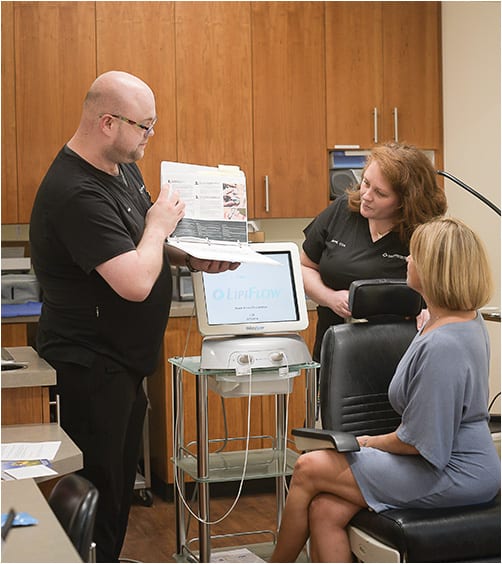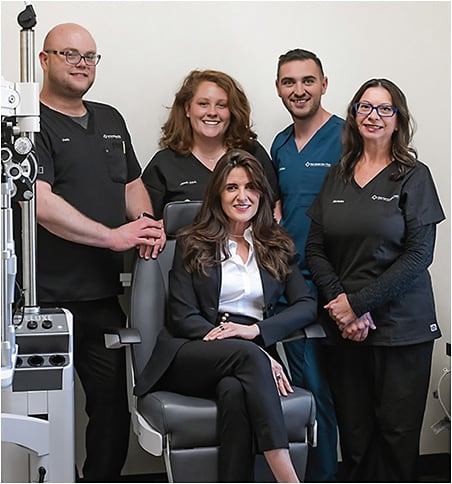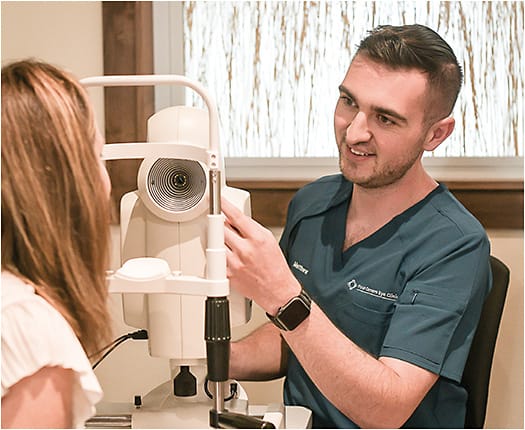
The Four Corners region in southwest Colorado is known for its sweeping vistas, its historic sites — and for being relatively remote and secluded. Because of that, eye-care services — particularly eye-care specialties — can be hard to come by. Fortunately, Four Corners Eye Clinic, headquartered in Durango, not only offers general ophthalmology services, retina, cataract, and glaucoma care, but they also have a dry eye clinic that is meeting a previously vastly underserved need.
A climate made for dry eye
Given the fact that dry eye disease (DED) is more prominent in Colorado’s climate (the low humidity and high winds increase the evaporation of tears), the availability of these services is vital to the community, says Marianne Sloan, MBA, practice administrator.
“We are quite rural, as the population of the entire county is only around 50,000, but it seems most of those people have dry eye because of our climate,” Ms. Sloan explains. “Prior to opening our dry eye clinic in 2019, the closest dry eye services were three or four hours away.”
Specialization needed
In 2019, Four Corners Eye Clinic brought in Linda Rose, MD, PhD, a fellowship-trained corneal specialist to help meet dry eye and other ocular surface needs. The attention-to-detail in the dry eye clinic has been a differentiator. Dr. Rose says that her training at the University of Pennsylvania and ultimately Johns Hopkins helped cultivate her understanding of the importance of the cornea — a part of the eye that she says is sometimes not given the attention it deserves.
“I realized that all the other areas of ophthalmology are looking through the cornea in order to see the retina or what they need to see,” she explains. “If the cornea appears hazy, that’s sometimes written off, when in reality a hazy cornea can have such a significant impact on vision and even surgical results. But sometimes that’s trivialized.”
Patients too often are simply told to get artificial tears, Dr. Rose says, “but something with preservatives that ultimately might make the problem worse.”
Even in areas with better access to specialists, Dr. Rose says that DED hasn’t always been prioritized. But she’s made it a focus.
Dr. Rose says that when you think of the cornea as a window — and you consider any smudges on that window — you start to recognize the impact that DED can have on vision and quality of life. She has shared that perspective with the members of the allied health team, who have also come to understand the significance of proper treatment.
No ‘one-size-fits-all’
Of course, anyone who has experienced DED doesn’t have to be convinced. Darin Campbell, COA, lead technician, is responsible for technician training — and is a patient of Dr. Rose himself. He says that the clinic has an extensive list of advanced dry eye treatment options that sets them apart.
“I did not realize how much better my eyes could feel until I started treatment,” Mr. Campbell says. “My experience allows me to speak to patients firsthand. It’s not a one-size-fits-all approach. Because we have so many options, if something does not work, we can shift gears and try something else. There can be a lot of time and energy invested into finding the right solution for a patient, but that’s why we’re here.”
Educate, then empower
Mr. Campbell says that all dry eye evaluations start with a tear osmolarity test and a dry eye questionnaire. He adds that Dr. Rose empowers techs to make executive decisions on whether the eye needs to be numbed right away.
“If a patient comes in with a lot of pain, the techs simply aren’t going to get a good visual acuity test or even a good pressure reading if they can’t focus,” Dr. Rose says. “I give the techs a lot of authority to make that decision to numb the eye ahead of seeing me if it’s going to improve the experience and the test results.”
Darin Campbell, COA, instructing the patient on performing an OCT.

The practice maintains a strong emphasis on education, and Dr. Rose aims to pass on her knowledge and experience.
“We will get on the microscope together and share the view as we look at a patient,” Dr. Rose continues. “I think it enriches their understanding of what we’re doing. I want it to be more than just going through the motions. Our staff is very engaged for this reason.”
Benefits of greater engagement
Matthew Necaise, head cornea technician, says that he appreciates the freedom that has been granted to use his own critical thinking skills.
“As technicians, we feel very supported in the decision-making process, and getting the patient completely ready to see the doctor,” he says. “Because the cornea is such a delicate and complex part of the eye, Dr. Rose’s dry eye appointments do tend to run longer. There is also a lot of education that we provide the patient.”
But Mr. Necaise explains that because techs handle much of the initial part of the exam — and even some of the patient education — they’re able to maintain patient flow. Thanks to Dr. Rose’s extensive experience and knowledge, he says he has learned a tremendous amount about DED.
'You are nothing without a good team'
So much of that comes back to training. At Four Corners Eye Clinic, there is an emphasis on finding what people are passionate about and getting them into the right role. Dr. Rose says that she recognizes some staff members enjoy being more hands-on than others.

FOUR CORNERS EYE CLINIC
- Founded: 1998
- Ocular surface disease equipment used: LipiFlow (Johnson & Johnson Vision), TearLab Osmolarity System (Trukera Medical), iTrace (Tracey Technologies)
- Doctors: 5 MDs
- Allied health staff:- Business office and call center: 2 plus an external billing company
- Front desk: 5
- Surgery coordinators: 2
- Technicians: 9
- Directors/managers: 1
Jazel Farrell, COA, surgical scheduler, says that thanks to cross training, she has transitioned roles and found an optimal fit. She began as a receptionist, moved into a technician role, and now is handling surgical scheduling, which she feels plays to her strengths.
“I was encouraged to complete continuing education and earn certifications, which was really great experience, but I ultimately realized I was more comfortable being in a behind-the-scenes role,” Ms. Farrell shares. “It’s a role where I can continue to be helpful to patients but is a better fit for my more introverted personality.”
Dr. Rose says that matching the right person to the right role is critical. Everyone brings value to the practice in different ways, and she emphasizes that it’s the “team approach” that makes them so successful.
“There is a quote from Vogue editor Anna Wintour that our practice lives by,” Dr. Rose says. “She said, ‘You are nothing without a good team.’ I truly believe that. We function as a team, and I think it is the key to our success.” OP








